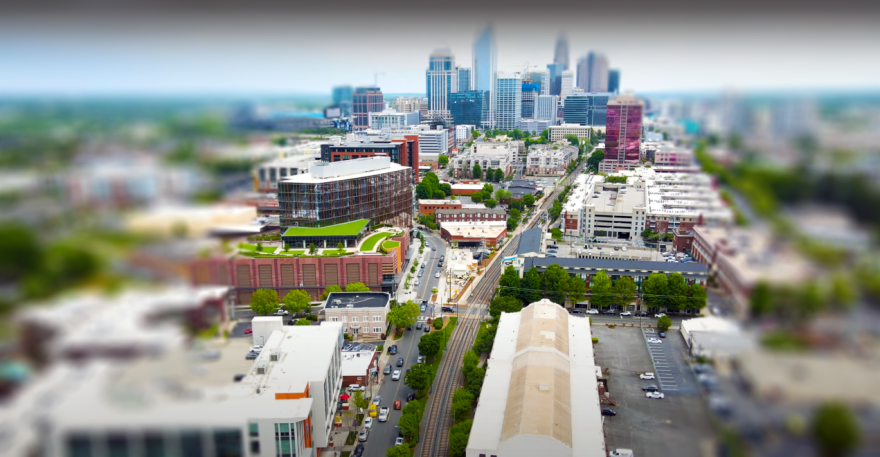Charlotte’s South End has changed tremendously in recent years, with new restaurants and stores and an explosion of apartments and office space. One area where it’s lacking, though, is hotels. That could be about to change. To talk more about it and other business news of the week, Ashley Fahey of the Charlotte Ledger Business Newsletter joined WFAE’s Marshall Terry for our segment BizWorthy.
Marshall Terry: Your story in the Ledger this week points out right now there’s just one hotel in South End, the Holiday Inn Express on South Tryon. Why aren’t there more in such a bustling part of town?
Ashley Fahey: I think a lot of things were on the drawing board right before the pandemic, but then, of course, the pandemic was a little bit of a death knell for some hotel business. It really wasn't a great time to be developing a hotel, although South End as a neighborhood was kind of ready and primed for that. Now that we've gotten a few years away from that, and now that there's a little bit more development interest, I think that some of those projects are coming back.
Terry: So, which hotels are on the way, and why does it matter for a bustling district like South End beyond having somewhere for people to stay when they come and visit?
Fahey: You think about all the companies that have moved to South End, and you think about all these kind of corporate clientele, the business aspect of South End, they don't really have a place to stay unless they go to uptown, which isn't far. Someone at a state-of-the-market event last week was saying, ‘yeah, I have clients coming in, they'd love to stay in South End, but there's really just no place for them.’ In order to be kind of this dynamic, mixed-use neighborhood, hotels are really a key component of that, I think. We do know that White Lodging, which operates the JW Marriott in uptown, they're trying to build a hotel at South Tryon and Bland. They're going through a rezoning right now. No details yet on what they're planning there, but when you think about the cost of land in South End, and they paid $8 million for that tiny sliver of land, which is less than an acre, you would imagine that a higher end brand would be needed to sort of justify the cost of development and the cost of land in South End.
So I would expect when we do start to see some hotels coming, think boutique, think higher end, certainly something maybe of the more four or five star caliber.
Terry: Over to uptown now, and what is being planned for the 50-year-old tower at 400 South Tryon. There’s been a lot of speculation about this. What can you tell us?
Fahey: This has been a very interesting building to track since the pandemic. Its occupancy rate, like many older buildings in uptown and other places, has really taken a hit. Apparently, it's looking like it will be converted into a mixed-use tower with hotel, residential, and ground-floor retail, which exists there today.
Terry: This is part of a larger trend happening with office towers, right?
Fahey: Yeah, absolutely. So you think about that 1970s-era building stock, even into the ’80s, you are starting to see a lot of interest in this, not just in Charlotte, but kind of everywhere. They are very challenging deals to pull off. And I think the 400 South Tryon building is especially interesting because the floor plates are kind of big in that building, for what it would normally be considered a good conversion candidate. But you're right, Marshall, a lot of owners and developers are trying to convert buildings from office to other uses.
Terry: Shalom Park, which is a hub for Jewish culture in Charlotte, recently announced its installing facial-recognition technology. What’s behind that move?
Fahey: The Foundation of Shalom Park has been rolling out new security measures. Last year, they said that the Leon Levine Foundation was contributing a grant of $350,000 to improve security at the 54-acre facility. As far as why this is happening, I reached out to the Jewish Federation of Greater Charlotte and the Foundation of Shalom Park, and they didn't want to go too far into detail. They did say, ‘We are committed to providing a safe and welcoming environment for all who visit the campus.’ I think it comes at a time when you are seeing a lot of Jewish centers across the country tightening their security. So I think that's all kind of playing into it, Marshall.



